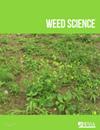A hydrothermal model to predict Russian thistle (Salsola tragus) seedling emergence in the dryland of the Pacific Northwest (USA)
IF 2.5
2区 农林科学
Q2 AGRONOMY
引用次数: 0
Abstract
Russian thistle (Salsola tragus L.) is among the most troublesome weeds in cropland and ruderal semiarid areas of the Pacific Northwest (PNW). Predicting S. tragus emergence timing plays a critical role in scheduling weed management measures. The objective of this research was to develop and validate a predictive model of the seedling emergence pattern of S. tragus under field conditions in the PNW to increase the efficacy of control measures targeting this species. The relationship between cumulative seedling emergence and cumulative hydrothermal time under field conditions was modeled using the Weibull function. This model is the first to use hydrothermal time units (HTT) to predict S. tragus emergence and showed a very good fit to the experimental data. According to this model, seedling emergence starts at 5 HTT and 50% and 90% emergence is completed at 56 HTT and 177 HTT, respectively. For model validation, independent field experiments were carried out. Cumulative seedling emergence was accurately predicted by the model, supporting the idea that this model is robust enough to be used as a predictive tool for S. tragus seedling emergence. Our model can serve as the basis for the development of decision support systems, helping farmers make the best decisions to control S. tragus populations in no-till fallow and spring wheat systems.预测美国西北太平洋旱地俄罗斯蓟(Salsola tragus)出苗情况的水热模型
俄罗斯蓟(Salsola tragus L.)是西北太平洋(PNW)耕地和半干旱地区最棘手的杂草之一。预测莎草蓟的出苗时间在安排杂草管理措施方面起着至关重要的作用。本研究旨在开发并验证西北太平洋地区田间条件下鼠李属杂草出苗模式的预测模型,以提高针对该物种的控制措施的效果。该研究使用 Weibull 函数模拟了野外条件下累积出苗时间与累积水热时间之间的关系。该模型首次使用热液时间单位(HTT)来预测 S. tragus 的出苗率,并显示出与实验数据非常吻合。根据该模型,幼苗萌发始于 5 HTT,50% 和 90% 的萌发分别在 56 HTT 和 177 HTT 时完成。为验证模型,进行了独立的田间试验。该模型准确预测了累积出苗率,从而证明该模型具有足够的稳健性,可用作三尖杉出苗率的预测工具。我们的模型可以作为开发决策支持系统的基础,帮助农民做出最佳决策,控制免耕休耕和春小麦系统中的赤霉病菌种群。
本文章由计算机程序翻译,如有差异,请以英文原文为准。
求助全文
约1分钟内获得全文
求助全文
来源期刊

Weed Science
农林科学-农艺学
CiteScore
4.60
自引率
12.00%
发文量
64
审稿时长
12-24 weeks
期刊介绍:
Weed Science publishes original research and scholarship in the form of peer-reviewed articles focused on fundamental research directly related to all aspects of weed science in agricultural systems. Topics for Weed Science include:
- the biology and ecology of weeds in agricultural, forestry, aquatic, turf, recreational, rights-of-way and other settings, genetics of weeds
- herbicide resistance, chemistry, biochemistry, physiology and molecular action of herbicides and plant growth regulators used to manage undesirable vegetation
- ecology of cropping and other agricultural systems as they relate to weed management
- biological and ecological aspects of weed control tools including biological agents, and herbicide resistant crops
- effect of weed management on soil, air and water.
 求助内容:
求助内容: 应助结果提醒方式:
应助结果提醒方式:


